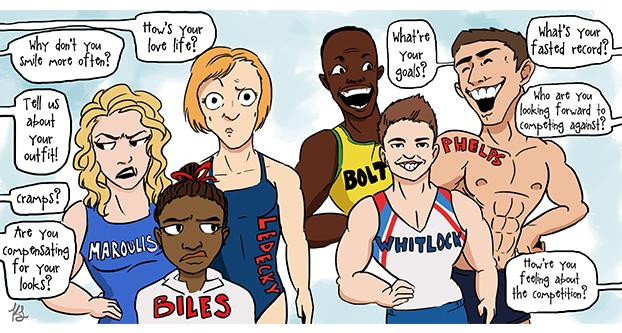Megan Bronson/ Special to The Collegian
Not every story about sexism in the Rio Olympics is actually sexist. A flush of trite finger-wagging articles are seemingly published every hour of the games, with one intention: to call out perceived sexism.
“Sexism” seems to be the buzzword of the Rio Olympics, with writers sitting in comfortable chairs across the world complaining about the coverage. This is not to say that there isn’t a horde of horrible things going on or being said about the female competitors. But today I want to look at some instances that have cranky writers up in arms about what they perceive as “sexism.”
Take for example: the print headline that read “Phelps ties for silver in 100 fly” with a subhead reading “Ledecky sets world record in women’s 800 freestyle.” The Internet has been up in arms over this headline for a week now, calling it sexist and belittling to Olympian Katie Ledecky.
Here is why this is perceived sexism. When headlines are created, they are made with the intent to draw you in to read more. Headlines have to start with the best foot forward, or readers won’t bother scanning the article. Right now the talk of Rio is Michael Phelps. Middle class moms are obsessed with sharing articles over this swole swimmer — so from a media standpoint it makes perfect sense to start with Phelps. The audience craves his wins and disappointments.
What the audience doesn’t know, for the most part, is who Katie Ledecky is. If the headline was “Ledecky sets new world record,” readers wouldn’t recognize the name and probably wouldn’t bother reading the article.
Was it insensitive? Probably. Did people read the article? Clearly. Not many would have read it if the headline had read differently. Before you accuse me of “mansplaining” and scroll to the top of the article to see if a man wrote this, let me tell you that constantly blaming the amorphous idea of “media” does not solve actual sexism.
The “media” wrote an article about Ledecky’s win. She was covered, as belittling as a headline is, that headline made people read about her accomplishments. Be on the lookout for moments where women were erased — there is no shortage in Rio.
One such erasure happened during an interview with U.K. tennis champion Andy Murray. BBC presenter John Inverdale was interviewing the tennis champion after he was asked how it felt to be the “first person to win two gold medals” for tennis. Murray disagreed saying that he was not — Venus and Serena Williams have won four each.
This is an example of actual sexism. Someone in media “forgot” that women were people, too, as if all significant athletic accomplishments belonged to men. As a member of the media it is imperative to be well-researched on those you are interviewing, as well as the subject matter. To not know about the Williams sisters and their accomplishments means one of two things: you either live under a rock, or you do not care about female athletes.
If you are reporting on the Olympics, you don’t live under a rock. That leaves Irvendale as the latter and therefore an insufferable troglodyte.
The immediate problem is that Irvendale is employed. The underlying problem is that female athletes do not hold the same reverence as male athletes. The fact that we call men’s tennis “tennis” and women’s tennis “women’s tennis” is proof of that.
The word “women’s” is attached to every sport because being a woman is a qualifier in the athletic world. It is an addendum that essentially is saying, “well, I guess we don’t want to trick people into watching women play sports” because evidently female athletes must linguistically be separated. And we all know how “separate but equal” turned out.
Keep a critical eye turned toward anyone who shouts “sexism” in a crowded theater. Keep a critical eye out for those who are erasing women in the “oh so common” way in which we are accustomed to hearing. The Olympics are over, but learn from them. Hopefully we can rinse and never repeat in 2020.




